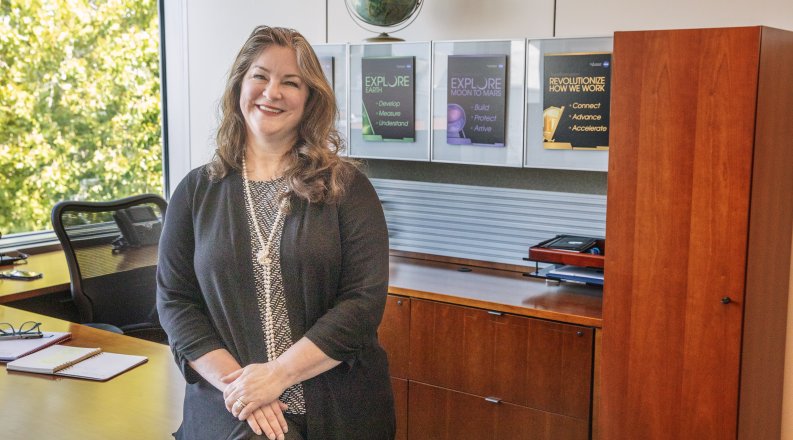Trina M. Dyal ’97 (M.S. ’01) (Ph.D. ’03)
Deputy Director, NASA Langley Research Center
When it comes to your career journey, Trina Dyal says embrace the curves.
“Every opportunity you have teaches you something different about your skills and about yourself,” says Dyal, who worked with missile systems at the Department of Defense and designed submarines at Newport News Shipbuilding before landing at NASA as part of a mid-career shift in 2003.
An ODU triple threat, Dyal earned her undergraduate degree in civil engineering and advanced degrees in engineering management and systems engineering. She was introduced to NASA by way of a cooperative education program while pursuing her doctorate, she says.
“It was in the systems engineering piece that I really found my focus and my passion, and that is a huge role that NASA has in creating these systems approaches to exploration.”
Since June, she’s been the deputy director of NASA Langley Research Center, a role in which she is responsible for overseeing approximately 3,500 civil service and contractor personnel, facilities valued at more than $5.36 billion, and an annual budget of approximately $1 billion.
Did you always want to work at NASA?
No, which is part of the beauty of it. I've never had a master plan; I've let opportunities drive where I should be. I've been fortunate that has worked in my favor, and I've had amazing people around me help drive where I should focus some of my attention. One of my ODU professors, Dr. Resit Unal, made me aware of the co-op opportunity at NASA —he helped open this door for me.
What’s the best or most surprising thing about working at NASA
There is a passion for perseverance here that I have never experienced before. And it is knowing that you are working with and trying to answer some of the most challenging questions that we know today.
What’s the coolest or most challenging project you’ve worked on (or one that makes you most proud)?
Back in 2017, I was asked to lead a team to look at Langley's ability to manage space flight development systems. We were given a set of questions to try to answer, and as we started to dig in and get data, we found that those questions were the incorrect questions to ask. We completely reframed what the team was doing to get at the intention of what we were being asked to do. By recognizing that we were asking the wrong questions, and it was not giving us the information we needed, we were able to make a difference in how Langley does space flight development.
We completely reorganized the Center for Flight Project Development, and we realigned leadership to be more focused on successful project execution. We developed a project management training program to build the next generation of project managers.
How did ODU prepare you for what you’re doing now?
The academics give you the tools, the professors help provide guidance, mentorship and motivation, and then it's up to you to decide what you're going to do with that.
My experience with ODU is the academics coupled with amazing professors made me want to continue to reach for greater and better and more ways to contribute. And because of that, I'm an adjunct for ODU. I want to pay it back.
What would you tell young Monarchs to convince them to add NASA to their list of employers to explore after graduation?
If you are an individual who has passion about changing the world, then NASA is the home that you need. And it's not just the traditional STEM disciplines. We need business, we need contracting, we need finance, we need law, we need trades. There are so many skill sets that go into changing the world that there is a place for everyone.



